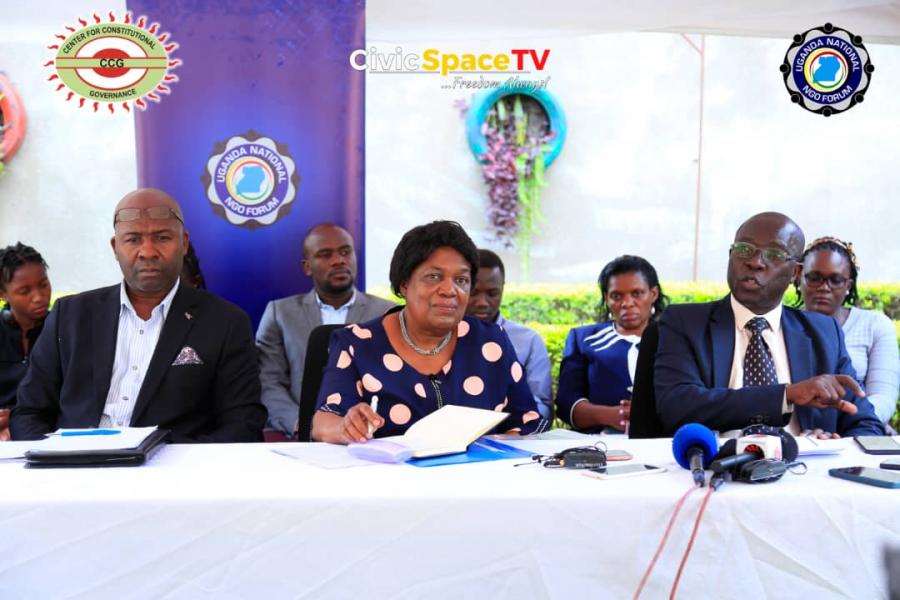
Civil Society New Year Statement – 2023
Civil Society New Year Statement – 2023
PREAMBLE
We the leaders of civil society organizations representing the broader CSO fraternity in Uganda, welcome Ugandans into the new year, 2023. We wish to congratulate everyone upon completing the year 2022. As leaders, we commit to doubling efforts in serving and standing up for the interests of all, serving as watchdogs and offering policy options to the government. In this New Year Message, we share our reflections on the previous year and offer some recommendations for the future as we begin the year 2023.
POSITIVE DEVELOPMENTS
- We congratulate the Ministry of Health for a successful fight against the spread of the Ebola Virus. For the communities in Mubende and Kassanda districts which were under lockdown, the declaration of Uganda as “Ebola Free”, marks a return to normalcy and hope that livelihoods will be restored.
We would like to thank our counterparts in the NGO Sector that worked closely with the Ministry of health, together with development partners, most especially the USAID and other UN Agencies for supporting various response mechanisms and the continuity of essential health and education services in the directly affected districts. We call upon our fellow citizens to maintain high levels of vigilance and hygiene to stem any potential outbreak. - We further applaud the efforts taken by government through the Directorate of Industrial Training (DIT) where youth are being empowered with vocational skills. This is a step in the right direction.
CONTINUING CHALLENGES
State of the national economy: We take cognizance of the worsening economic conditions, characterized by food insecurity, the high cost of living and increased prices of consumer goods and fuel, creating discomfort for citizens. With the high costs of credit and joblessness, most Ugandans are left living on the edge unable to afford a decent living and support their children’s education. We call upon the government to enforce the proposed school fees structure in schools to ease the burden off the suffering citizens and address the high costs of fuel which has a high multiplier effect on the cost of living.
The growing public debt: We are concerned about the growing public debt which is currently standing at 50.3 % of GDP. Unfortunately, most of the borrowed funds are lost through multiple public sector leakages. While borrowing might be inevitable, we call upon Parliament to only approve borrowing to support projects with a high economic and fiscal return. Within the medium term, the government should clear domestic arrears as a means of supporting the economy and reducing the costs of doing business.
Loss of public confidence in National Social Security Fund: A cross-section of Ugandans has reacted with consternation at the series of recent media reports surrounding the management of the NSSF. Most savers are worried that their savings might no longer be safe given the alleged political interference in the management of the Fund. We call upon the Uganda Retirements Benefits Regulatory Authority to intervene and ensure that the interest of members is protected.
We further call upon the NSSF Board to ensure that the NSSF is managed professionally and avoid undue political influence.
Shrinking of civic space and human rights situation: Citizens in Uganda continue to face obstacles to free expression, association and assembly. The physical and virtual spaces where citizens associate, assemble and express themselves have been significantly narrowed through the enforcement of regressive laws. These actions reduce citizens’ confidence in government institutions and reverse the country’s democratic gains. We call upon the government to address the various reports and incidents of human rights violations and provide an enabling environment for civic expression as provided for under the Constitution. More specifically we ask the Judiciary to expeditiously handle cases to avoid prolonged detention without trial.
Increasing road accidents: Recent traffic reports indicate an increase in carnage on our roads. In December 2022 alone 185 lives were lost, devastating families and communities, and causing untold anguish. Most traffic reports attribute this trend to indiscipline and recklessness by individual road users. It is also important to note that the majority of our roads are in a poor state. This is despite the fact that road construction has been taking the biggest share of the infrastructure budget. We, therefore, wish to call upon the government to improve public road infrastructure and address the corruption challenges in the road sector. We ask the Traffic Police to enforce all traffic rules and regulations on all road users in spite of their status. We further encourage fellow citizens to take extra caution while using roads and follow all the traffic
rules and regulations.
A CALL TO ACTION AND OUR COMMITMENT
- We call upon the government to fast-track the national insurance policy, ensuring that all Health Centres are connected to the national electricity grid, and functional water supply.
- We call upon the President and responsible government institutions to develop mechanisms that will ensure the country returns to a low risk of debt distress and address the misuse of public resources. Rigorous transparency and accountability measures should be put in place to ensure that the borrowed funds are used for their intended purpose.
- Government institutions, especially the Uganda Police Force and the judiciary must protect the rights of all Ugandans to freely express themselves and associate, in spite of their political affiliations.
- The Judiciary must expedite the handling of cases involving all individuals detained for long periods without trial to ensure that justice is not delayed.
On our part, we reaffirm our commitment to always be available to fulfil the immense task of bridging the gap between citizens and the state and addressing the issues that couldn’t be fulfilled by governments alone. Our advocacy will focus on proposing solutions to certain policy issues, and constitutional reforms that facilitate values-driven political decisions.



